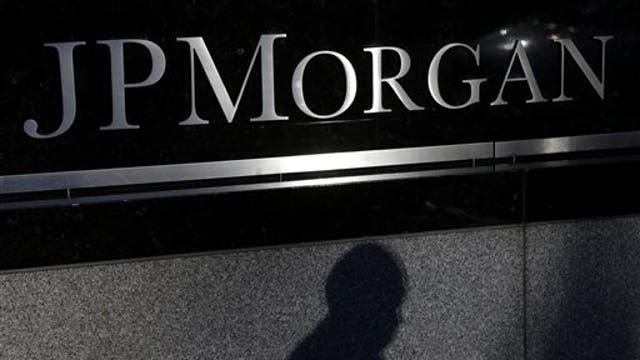D.C. Does Create Jobs...on Wall Street
“This is our new reality: What with Washington’s constant demands, new rules, probes and investigations, with the number of workers we need to deal with all that, you gotta say to yourself, government really does create jobs on Wall Street.”—Morgan Stanley employee quips to Fox Business
At an estimated $22 billion, JPMorgan Chase’s (NYSE:JPM) legal stockpile is now bigger than the market valuations of 297 companies, or 60% of the companies that comprise the S&P 500 index. Its war chest is bigger than the market caps for International Paper (NYSE:IP), Marathon Oil (NYSE:MRO), Waste Management, Kellogg (NYSE:K), Kroger, Cigna and T. Rowe Price.
That $22 billion figure is about 10% of JPMorgan’s own market cap, and it just about equates to the quarterly revenue made by the world’s largest bank by assets. JPMorgan’s recent forecast of $5.9 billion more in legal costs coming down the road is a sum that would have wiped out its entire third quarter net profit. The bank faces a new Justice Dept. criminal probe into alleged forex trading manipulation; five other banks including Citigroup (NYSE:C) are under scrutiny here and overseas.
The investing world has sat back and watched Justice Dept. officials speak with involuted pride about how it has extracted some $37 billion in fines from the world’s largest banks over the last year. The headline: The government is making banks pay for the financial collapse, money that goes to the Justice Dept.’s own war chest to exact even more pain. But the cost is also borne elsewhere.
Wall Street has 10,500 fewer jobs than in 2011, the workforce totals 162,400. But the Wall Street regulatory workforce has mushroomed. Citigroup alone says it may increase its compliance workforce by a third since 2011, to nearly 30,000 employees by year-end, equal to about 13% of its overall headcount. Bank of America (NYSE:BAC) has about doubled its compliance staff since 2011, and JPMorgan is already in the process of increasing its risk control staff by 30% since just last year.
The absence of perp walks in the wake of the worst financial collapse since the Great Depression has only made investors and executives realize one thing. Government oversight had never really existed at all, despite sufficient rules on the books for decades, and despite the massive subprime accounting fraud perpetrated.
For instance, after the S&L crisis, Congress enacted a new law in its 1991 reform legislation, a "systemic risk" rule, which gave Washington the power to protect depositors and creditors from the collapse of a large failing bank.
Instead, now we have the unproductive vegetative universe of Dodd Frank, a law still not completely written, creating a cornfield of regulators on Wall Street. (for similar fare, read http://www.foxbusiness.com/economy-policy/2014/10/30/zombie-land-usa/).
The passage of time gives shape to reality. Sloppy was the crackup, sloppy was the response, with $7 trillion in new government spending, $3.5 trillion in Federal Reserve help, zero bound rates—and still few cops on the beat. There is no shortage of regulation, just spines to enforce existing rules.
So, after-the-fact refereeing is in vogue, with made-for headlines probes, fines and settlements that will carve huge chunks out of Wall Street’s bottom line, when even Enron and Arthur Andersen killer Leslie Caldwell at the Justice Dept. recently said indictments are a better (cheaper) deterrence.
Meanwhile, outgoing attorney general Eric Holder recently didn’t have to take a breath in answering who should play him in a movie: “There’s only one person, Denzel,” as in Washington.
E pluribus meum.
Think for a second when you listen to regulators drone on in marvelously dull speeches loaded with tiny micro facts, processed to the consistency of Velveeta cheese.
Speeches filled with grave, reverential orotundities that make your brain feel like spongiform at the end. Consider this: Stubbornness, and politics, can drain common sense.
Meanwhile, JPMorgan is now battling more than 15 probes from governments and local authorities on a number of continents. JPMorgan also disclosed the Justice Dept. is scrutinizing its internal controls in the forex probe, embarrassing given the bank’s poor risk controls were largely to blame for the London Whale loss last year. It says it has “established reserves for several hundred of its currently outstanding legal proceedings,” which include class action lawsuits.
Bank insiders reveal another reality, one JPMorgan executive told Fox Business: “We are having meetings to talk about meetings about meetings with regulators.” A Citi employee told Fox Business: “I can’t tell you how many hours and costs are wasted dealing with all these different federal guys, and state bank regulators, too. They (regulators) don’t talk to each other. That is wasted time and money we could spend on lending money to grow the economy.”




















